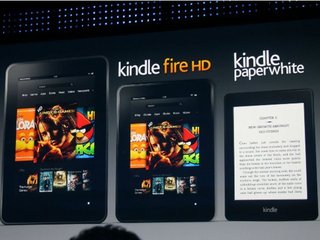House introduces bipartisan bill on AI in banking and housing
The bill would require a report on how these industries use AI to valuate homes and underwrite loans
Read more...
Updated to add comments from Morningstar analyst R.J. Hottovy.
Amazon has earned a reputation for undercutting the competition—sometimes at its own peril. Remember when the giant, clunky Kindles came out and Amazon was buying e-books at full price and selling them at a loss? It was all part of the never-ending consumer acquisition quest that Amazon has been waging since the days of yore.
Now, rumor has it that Amazon may be undercutting itself once again. The e-commerce Lord and Master is reportedly building a $99 Kindle Fire, according to TechCrunch, which doesn’t stand firm by the information but rather calls it a “rumor” that they’re hearing.
Is Amazon undercutting everyone—itself included—by building a $99 Kindle Fire?
The short answer, says Amazon, is no.
“It’s not happening,” said a company spokesperson. “We are already at the lowest price points possible for that hardware.”
Indeed, it sounds pretty far-fetched. Remember last October when Amazon CEO Jeff Bezos admitted in an interview that Amazon manufactures the Kindle Fire at cost? In other words, Amazon breaks even on all of its hardware—so there’s no profit to be gained specifically from increased tablet sales. The profit comes from consumers buying Amazon content through those Kindle Fires.
“We want to make money when people use our devices, not when they buy our devices,” said Bezos at the Kindle Fire HD unveiling last September.
So what good would it do to take a loss on a $99 Kindle Fire?
Or is this one of those crazy-like-a-fox things that Amazon has a penchant for? IDC estimates that tablets running Android will actually unseat the iPad in market dominance this year. In 2012, Apple enjoyed 51.3% of the tablet market, but in 2013, its market share is expected to drop to 46%, while Android tablets are expected to surge to 48.8% of the market.
And who is leading among the Android tablets? You guessed it: Amazon. A February report from Localytics reveals that in the U.S. and Great Britain, the Kindle Fire accounts for two-thirds of all Android tablets. In the U.S. alone, the Kindle Fire accounts for 59% of all Android tablets. By contrast, Google’s Nexus 7 accounts for just 8% of the market.
But here’s the kicker: the remaining 31% is made up of “other” tablets—you know, those super-duper low-cost tablets that you can pick up at the grocery store. With Apple still running the show in the high-end tablet market, could Amazon be working on a tablet to take over the ultra-low tablet market?
"I believe Amazon has the ability to manufacture a quality tablet at $99. I would expect limited functionality, but it will help Amazon better compete with new low priced rivals coming to the market," said Morningstar analyst R.J. Hottovy. "Obviously, this tablet will have less functionality and capacity than other versions, but I believe there is certainly a market for such a product."
As TechCrunch’s Sarah Perez notes, Amazon’s chip maker Texas Instruments is leaving the chip business behind, which could mean that Amazon got a clearance deal. That doesn’t exactly sound like a sustainable, long-term plan for Kindle manufacturing, though.
Another possibility is that Amazon may actually be willing to take a loss in order to boost Prime subscriptions. In a recent report from R.J. Hottovy, Prime subscriptions got a huge boost when the Kindle Fire first came on the scene at the end of 2011. Hottovy estimates that Amazon Prime now has 10 million subscribers, up from four million at the end of 2011, and the Kindle Fire played a big role in that—particularly as Kindle Fires started coming with free 30-day Prime trials. And Prime subscribers are a big part of Amazon’s business, making up roughly one-third of Amazon’s operating income.
Could this be one of those cases where Amazon takes a loss to gain momentum for the long haul?
"Absolutely. E-commerce is still very much a land grab, in our view, and it is clear that customer/member growth is Amazon's number-one goal right now, even if comes at the expense of near-term profitability," said Hottovy.
Image source: washingtonpost.com
The bill would require a report on how these industries use AI to valuate homes and underwrite loans
Read more...The artists wrote an open letter accusing OpenAI of misleading and using them
Read more...The role will not be filled by Elon Musk, though he will be involved in who is chosen
Read more...


